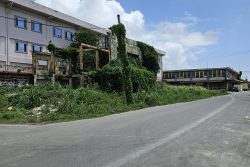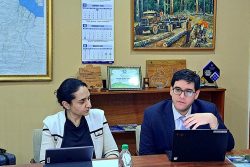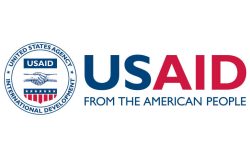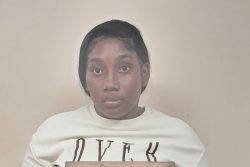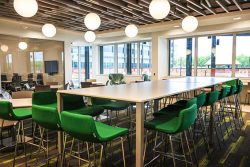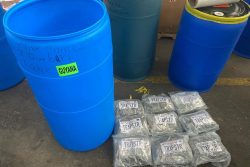On the eve of the second anniversary of the accession to office of the APNU-AFC administration, President David Granger talks with The Guyana Review about his administration, his presidency and his vision for the future of Guyana
________________
Guyana Review: You are the only President of Guyana ever to have served in that office without the benefit of any prior Cabinet experience. How would you describe that initial feeling of having to lead a nation without what one might call a prior related leadership credentials?
President Granger: Mrs. Janet Jagan served an incomplete term during the colonial period, thirty-five years before becoming President. By comparison, also, persons in other jurisdictions such as Evo Morales, Barack Obama and Nelson Mandela became Presidents without ‘prior Cabinet experience.’ My initial feeling was one of self-confidence and conviction.
I brought to the Presidency my service as a military leader, as the leader of my party and as leader of a partnership which combined to form the largest combination of political parties in Guyana’s history.
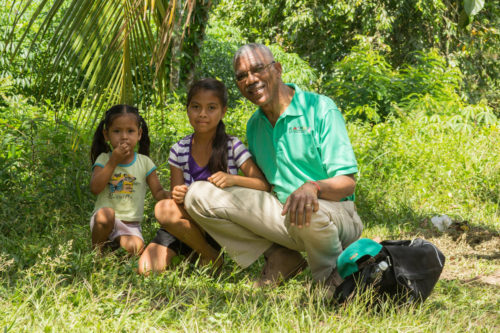
I brought my experience as a leading member of significant non-governmental organisations, as an academic and as a businessman in the private sector. My long public service gave me a good understanding of the needs of this nation and a sound grounding in public administration.
Guyana Review: I recall that, at the very beginning of your presidency, you said that you wanted to be the best President that Guyana has ever had. What particular accomplishments would you say would qualify you to realize that ambition?
President Granger: I do not share your recollection. I am certain that my exact words at my swearing-in on 16th May 2015 were that I would be “…a good President…a President of all the people.” This means that I intend to be a good President for every Guyanese, regardless of ethnicity, class, gender or religious affiliation.
My commitment to a new culture of civility in politics, my love for this country, my service to society and my vision for economic development and social cohesion prepared me for the presidency. The people of Guyana, ultimately, will be the judge. My mission is to be “a good President” in every respect.
Defining Guyana as a ‘green state’ and identifying environmental protection as a main ingredient in the direction of national development, most likely, will be my administration’s most valuable and most enduring accomplishment. The acceptance by the entire country of the absolute necessity of preserving the environment, protecting our wildlife, preventing environmental degradation and understanding the effects of climate change will not be easy but will be essential to enjoying the good life that we all deserve.
Guyana Review: One day, you are just a candidate vying for office and, the next, you are carrying the weight of the nation’s expectations on your shoulders. Is there a breathing space between the two – a brief period in which to re-group – or is it a matter of having to hit the ground running?
President Granger: The business of running a country is a ceaseless, and sometimes sleepless, duty. I did not expect ‘a breathing space’. Every President has to hit the ground running. The Coalition’s manifesto outlined the broad areas of domestic policy, which I am following. Life can be very short and my administration’s policies have to be driven by a sense of urgency.
The President of the Bolivarian Republic of Venezuela, for example, issued Decree No. 1.787 purporting to annex almost our entire maritime zone on the day of my inauguration, May 26th, 2015, our Independence anniversary. My administration has had to work very hard from ‘day one’ towards bringing a final resolution to this threat to our sovereignty.
Guyana Review: How do you separate what, invariably, is the weight of the electorate’s myriad and immediate expectations from your duty to create what is often a coherent agenda for governing which, very often, sets priorities that are ordered differently from public expectations?
President Granger: My prior service as leader of my Party and leader of the Opposition in the National Assembly and my engagements in constituencies countrywide helped me to understand the electorate’s expectations. I was able, on this basis, to craft a coherent agenda for governing that was conscious of the public will.
My administration inherited a grave crime situation, poor infrastructure, a dysfunctional local government system, wasteful and broken projects – including the notorious Fibre Optic Cable and Skeldon Sugar Modernisation Projects – and a heavily-indebted sugar industry requiring billions of dollars in bailouts that we could have used to build schools.
My campaigning across the country in two elections provided me with a comprehensive understanding of the social and economic needs, rather than just the expectations, of the mass of people in rural and riverine areas in every region.
The people are beginning to see change. My administration is going to make the sugar industry competitive again. My administration has made improvements to aerodromes, bridges, roadways and stellings and other major infrastructural projects. Some changes, such as the payment of debts incurred by the previous administration and increases in public servants salaries and old-age pensions are less visible to the public eye.
Guyana Review: Is greater media freedom one of the ambitions of your administration and how do you assess the pace of progress towards that goal/ambition?
President Granger: My administration is committed to guaranteeing press freedom and to non-interference in the independent media. Independent media act as watchdogs of the Government and promote transparency by ensuring that truthful and timely information is provided to the public.
The constitutional guarantee of freedom of information is concerned also with enabling citizens everywhere to access information. The State media, in this regard, play a role in ensuring that people in our rural and riverine communities are provided with greater information about the work of government.
I have committed to support training through the Guyana Press Association. My administration has not interfered with, and will not undermine, the professionalism of media workers by subjecting them to political direction in their work.
Guyana Review: Your Excellency is aware that it is only natural [that] the public will form their own opinions of the President and the presidency. How do you respond to the view that has been expressed that, as President, you could perhaps engage in more day-to-day interaction – ‘grounding, if you will – with ordinary people in their respective settings?
President Granger: I interact with Guyanese all over this country as a regular part of my day-to-day duties as President. Images of my recent visits – to Muritaro in the Demerara River; to Cabacaburi and Friendship in the Pomeroon River; to Bartica, Leguan and Wakenaam in the Essequibo River and to Anna Regina, Parika, Lusignan and Friendship – all over the past two weeks, have been published in the newspapers for all to see.
I have visited riverine communities – in the Berbice, Canje, Cuyuni, Demerara, Essequibo, Kako, Mahaicony, Mazaruni and Pomeroon Rivers – during my Presidency. I have made countless visits to urban, rural and hinterland communities. In many cases, I handed over boats, buses and bicycles to school-children and ordinary villagers with whom I reacted easily and freely.
I meet ordinary church-goers at religious ceremonies; with residents at commemoration activities such as the Abolition of Indian Indentured Immigration Day and Chinese Spring Festival and hundreds of children and adults during these engagements.
This is a large country relative to its population. My responsibilities to all Guyanese mean that, in my day-to-day work, I should travel out of the city and meet rural and riverine residents, and I do so.
Guyana Review: Much of the preoccupation of your government has been with what it considers to be righting the wrongs that occurred under the predecessor administration. To what extent would you say you have made any headway in that regard and to what extent has that preoccupation distracted from the unfolding of your administration’s own agenda?
President Granger: My administration’s agenda to ensure that corruption is dealt with at all levels cannot be considered a distraction. Commissions of Inquiry have provided us with some of the information we need to solve the problems we inherited. Solving problems will take time but we are confident that the changes we are making will be in the best interest of the country.
The re-introduction of local government elections last year has not received much media comment. I believe, however, that the practice of local democracy, the conduct of regular municipal elections and the establishment of capital-towns at Bartica, Lethem and Mabaruma, and later at Mahdia, will contribute to transforming the hinterland. The four regions occupy three-quarters of our land-space and possess the bulk of our natural resources but the delivery of public services there has been inadequate. The creation of new towns is a forward-looking, even futuristic, aspect of our agenda. I am proud of the way in which the newly-elected mayors have approached their responsibilities.
I have addressed the National Assembly five times in two years. That is a record. The aims of these addresses have always been to lay out to the Assembly our plans for the future. Two of them – in 2015 and 2016 took place at the start of new parliamentary sessions and were timed to precede the presentation of the annual budget. We are pursuing an agenda for future development and are not distracted by the past.
Guyana Review: The announcement of the discovery of major oil and gas reserves has occurred under your presidency. At the same time, you have been forthright in your public focus on ‘a green economy.’ How do you ‘square the circle’ between – on the one hand – the imperative of the green economy and, on the other, the reality of oil reserves the extent of which can transform the economic fortunes of Guyana?
President Granger: Guyana has to protect the habitats of our rich fauna and to preserve the environment from degradation. Our grasslands, highlands, wetlands and rainforests are valuable assets. There is no ‘shadow of turning’ from our path to becoming a ‘green state.’ Guyana needs to develop its infrastructure so that we can develop our eco-tourism industry. Guyana has to reduce its reliance on fossil fuels.
Future oil revenues will help to develop ‘green’ technologies, including ‘green energy’ options that will lower the cost of production in the manufacturing sector and improve the delivery of public services to the people. Oil is still a commodity in demand, and I have said repeatedly, we want to use the earnings largely to promote a sustainable ‘green’ development programme. This is a period of transition from a mainly extractive economy to one that is more environmentally conscious. We need to walk on two legs.
Guyana Review: Since your accession to office we have not witnessed what one might call a succession of major and aggressive external expressions of interest in investing in Guyana. Does that bother you or do you see expressions of interest accelerating in the period ahead?
President Granger: Investors want to see stability and security and we are creating such an environment. Invest-ments are not overnight ventures; they have a gestation period, during which investors undertake feasibility and other studies before sinking their capital. This is happening.
My administration is improving the country’s reputation as a safe investment destination. Public education is important in training a skilled work force and this explains why we adopted the ‘every child in school policy.’ Public infrastructure is important to enable investors to visit the country and travel to the regions. Public security is important to ensure human safety and suppress transnational crime. Public telecommunications are important to support business, education and citizens’ daily lives.
Guyana Review: Job creation has been one of the major expectations of the populace under your administration. To what extent would you say this has been realized and which sectors do you see the jobs coming from, going forward?
President Granger: My administration recognises that there is need to create more jobs and several programmes – such as the Sustainable Livelihood and Entrepreneurial Development (SLED) initiative; Hinterland Employment and Youth Service (HEYS) and the Linden Enterprise Network (LEN) – have opened windows of opportunity and employment for younger persons.
The administration continues to promote agro-processing and micro-enterprises as means of self-employment. The Guyana Youth Corps will be launched, mainly for out-of-school young people in January 2018. We are working to create an enabling environment for private and foreign direct investment which, in turn, will create jobs.
Guyana Review: Your Cabinet includes a Minister responsible for Social Cohesion. The view has been expressed that this is much more a populist political gesture than an initiative underpinned by any real expectation of genuine improvement in the social cohesiveness of our country. How do you respond to that view?
President Granger: It is an irrefutable fact, not a figment of someone’s imagination, that social divisions, historically, have been a major obstacle to economic progress. The establishment of a Ministry of Social Cohesion is the first serious attempt by any government to overcome the challenge of disunity in a methodical manner.
The Ministry has held 30 consultations countrywide with nearly 1,500 persons. They have recognised the importance of national unity as a foundation of national development. The Ministry has launched a Five-Year Strategic Plan. That Plan has clear objectives and provides a roadmap for accomplishing them.
Social cohesion, also, is about promoting harmony and unity at all levels of society – from the family to the community and to the nation – and, in that regard, this is a work in progress.
Guyana Review: Supporters of the David Granger administration have suggested that the circumstances of your accession to office (that is to say what your administration perceives to be the task of righting the wrongs of its predecessor) make a case for a second term in office. How do you respond to that view and what is you disposition on the issue of running for a second term in office?
President Granger: My selection as a presidential candidate is a matter that my party and our partnership will have to determine and they will decide if I should run for a second term. My mission, in the short term, is to repair the damage to the economy and society which we inherited.
My vision, in the longer term, is to give every Guyanese child the good life which I promised. The holding of local government elections, the creation of three new towns, the adoption of a green state strategy are evidence of my policy. Whether the realisation of that vision requires my serving a second term will be a matter for my party to propose and for the people to decide.
Guyana Review: How satisfied have you been with the effectiveness/success of the APNU-AFC coalition as a government and do you see a longer-term future in that coalition?
President Granger: I created a cabinet of fifteen ministries in May 2015. The Ministries of Citizenship and Social Cohesion within the Ministry of the Presidency have proven their worth. I have made some portfolio adjustments which resulted in the establishment of a Ministry of Public Telecommunications and a Ministry of Natural Resources. I also found it necessary to establish a new Department of the Environment.
I am satisfied that this ministerial and departmental architecture has been effective and efficient. I monitor ministerial performance continuously to ensure that all facets of government responsibility receive fullest attention.
I am an apostle of coalitions and consensus-based politics. This country must abandon the winner-takes-all mindset and embrace the virtues of political partnerships and coalitions. We have had enough of victors and victims. My coalition is an example of how six parties can work as partners.
Guyana Review: There has been, from time to time, open and aggressive criticism of the performances of some of the members of your ministerial team. Has some/most/all/any of the criticism been justified?
President Granger: Members of the public have the right to comment on the performance of the Government they elected. Members of the Government have a duty to listen to what the public says and to respond appropriately. I am confident in the competence of my Cabinet to perform the functions that have been assigned to them. I have not dismissed any Minister.
I do not ignore public criticism some of which is sincere and justified. Some criticism has come about as a result of inadequate communication and misunderstanding of the Government’s intentions. We have conducted continuous engagements with communities aimed at solving local problems and delivering public services to citizens.
Guyana Review: What is your own candid assessment of the performance of your ministerial team?
President Granger: The performance of the Cabinet has to be measured in the context of what we inherited in May 2015. My candid assessment is that my ministers’ performance has been good. The portfolio adjustments which I made have improved the team’s performance.
The Cabinet, collectively, continues to confront challenges in difficult areas, such as education, public health, public security and the sugar industry, for example. These challenges are historical and did not arise over the last two years. I expect that, by 2018, the situation would have improved and the public will see the benefits of the changes that we are making in these various ministerial sectors.
Guyana Review: What are the primary foreign policy goals of your government at this time and how satisfied are you with the quality of our bilateral relations with our respective neighbours?
President Granger: Guyana’s foreign policy goals are aimed at the protection of citizens, our country and the Caribbean community. Citizens have the right to the protection of the state. The State of Guyana has an obligation to extend its protection to every single citizen. I have said before that the enormous size, extensive dispersal and the enthusiastic patriotism of the diaspora are assets to be prized.
Our Foreign Service is working hard to improve relations with our three continental neighbours. The President of Suriname and I have exchanged visits. We regard the protection and projection of Guyana’s sovereignty as essential elements of our diplomacy.
We are a small state and, notwithstanding our limitations, we enjoy very cordial relations with Brazil and Suriname. Relations with Venezuela, notwithstanding that country’s internal situation, have not worsened. My administration is working with the UN Secretary General’s personal representative on a process that we expect will result in the the resolution of the territorial controversy.
Guyana Review: I am aware that, in ‘another life’ as a writer and publisher, you paid a considerable amount of attention to Guyana’s foreign policy. Could you tell us a bit about your own foreign policy focus and the extent to which it has been, up until now, responsive to the country’s needs and interests?
President Granger: The Caribbean Community remains the important focus of our foreign policy. The strengthening of the Caribbean Community is vital to our national economy and security. I am currently the Chair-man of CARICOM and I place much emphasis on community solidarity.
Guyana has sought and always received support for its territorial integrity from the Community. I have also projected Guyana as the hinterland of the Caribbean as we work to encourage more economic partnerships with member States. My visits to The Bahamas, Barbados, Belize, Haiti, St. Vincent, Suriname and Trinidad and Tobago are all part of my work.
Guyana is also part of the wider hemispheric community. We remain fully engaged in the councils of the Association of Caribbean States (ACS); Community of Latin American and Caribbean States (CELAC); Union of South American Nations (UNASUR) and the Organisation of American States. Our aim is to ensure that the Caribbean can become a zone of peace and that this country can proceed with its economic development.
Guyana also seeks markets for its products and services and needs to attract increased investment, economic cooperation and trade with the rest of the region and the world. Economic diplomacy is a major focus of my administration’s foreign policy.
Guyana Review: Public security is a subject on which you have written and commented exhaustively as a writer and commentator. Issues of crime and public security remain a serious challenge under your presidency. Can you point to areas in which your government has been able to make any serious inroads into the crime situation?
President Granger: My administration recognised, at the outset, that the crime situation in this country was the direct consequence of the performance of the previous administration in the Troubles of the first ten years of this century. Phantom gangs wreaked nightly havoc. There were numerous uninvestigated murders. The Guyana Police Force was weakened. British security assistance was rejected while known narco-traffickers walked freely.
I have been directly involved in the security of this country from the time of taking office. I have established a National Security Committee which meets weekly and I have created a National Anti Narcotics Agency (NANA) and a National Intelligence and Security Agency (NISA). I have requested the British Government to consider the re-introduction of a form of the Security Sector Reform Action Plan which the previous government rejected for dubious reasons.
We are seeing the results. We are aware that, as a consequence of the trauma of the Troubles, there has been a secondary impact evident in an elevated level of anti-social behavior and inter-personal violence within homes and neighbourhoods.
Guyana Review: Do you consider the Guyana Police Force to be any better equipped to tackle crime after two years of your government in office?
President Granger: The Police Force is being better equipped to do its work. The Force received a new fleet of cars, all-terrain vehicles, pick-ups and motor cycles in 2016. Piracy has virtually disappeared. The headquarters of the huge hinterland division has been relocated to the town of Bartica.
My administration has strengthened the Police Force’s Criminal Investigation Department which is making more and faster arrests. The Serious Organised Crimes Unit (SOCU) is a functional branch of the Force and it is gradually exposing crimes that were once concealed. In the words of Longfellow, “Though the mills of God grind slowly, yet they grind exceedingly small.” The country is discovering, gradually, how wide and deep the corruption was under the previous administration and how my administration’s measured approach is exposing and extirpating criminal behaviour.
The Security Adviser attached to my Office under an agreement with the British Government is currently examining 18 years’ worth of reports of consultancies and commissions of inquiry. He is examining and assessing Police needs with the aim of implementing much-needed reforms.
Guyana Review: The issue of constitutional reform would appear to be very much on the public and political agenda though it is difficult to see how headway can be made in that area in the absence of a convivial political environment. Much of the exchange between government and opposition continues to be characterized by anything but conviviality. Is it not difficult to see us making meaningful headway on the constitutional reform front in such an environment?
President Granger: Constitutional reform remains important to my administration. We have started the process but we insisted, from the outset, that reform must be based on public consultation rather than another boardroom cut-and-paste exercise. Reform cannot be done satisfactorily without the engagement of the members of the public in the process. This is going to take time.
I have the Leader of the Opposition on a variety of matters and those discussions have been cordial. I shall continue to meet him as often as necessary. My administration and the Opposition have to listen and talk to each other for the public good.
